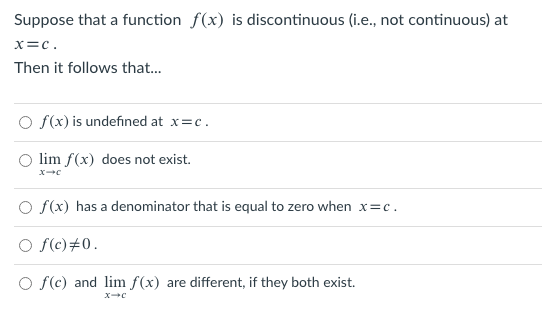Suppose that a function f(x) is discontinuous (i.e., not continuous) at x=c. Then it follows that. O f(x) is undefined at x=c. lim f(x) does not exist. O f(x) has a denominator that is equal to zero when x=c. O f(c)#0. O f(c) and lim f(x) are different, if they both exist.
Suppose that a function f(x) is discontinuous (i.e., not continuous) at x=c. Then it follows that. O f(x) is undefined at x=c. lim f(x) does not exist. O f(x) has a denominator that is equal to zero when x=c. O f(c)#0. O f(c) and lim f(x) are different, if they both exist.
Chapter3: Functions
Section3.3: Rates Of Change And Behavior Of Graphs
Problem 2SE: If a functionfis increasing on (a,b) and decreasing on (b,c) , then what can be said about the local...
Related questions
Question

Transcribed Image Text:Suppose that a function f(x) is discontinuous (i.e., not continuous) at
x=c.
Then it follows that..
O f(x) is undefined at x=c.
lim f(x) does not exist.
O f(x) has a denominator that is equal to zero when x=c.
O f(c)#0.
O f(c) and lim f(x) are different, if they both exist.
Expert Solution
This question has been solved!
Explore an expertly crafted, step-by-step solution for a thorough understanding of key concepts.
Step by step
Solved in 2 steps with 2 images

Recommended textbooks for you

